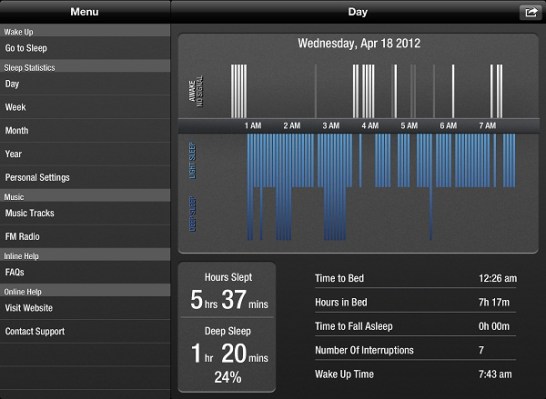Over the last six nights, I’ve learned that I’m not a great sleeper. I need at least a half hour to doze off, and I’m likely to stir from my slumber a few times or more during the night, which in turn prevents me from getting enough deep sleep.
Although I’ve suspected those things for some time, Gear4’s Renew SleepClock has delivered irrefutable evidence: charts of my sleep patterns, appearing every morning on a companion app.
The $199 SleepClock, which looks like a bulky iPhone speaker dock, isn’t the first sleep monitor on the market, but it’s the only one I know of that doesn’t require users to wear anything. Instead, it captures your tiniest movements through a low-power radio frequency emitter while perched on a nightstand, and records the data to an iPhone, iPod Touch or iPad.
In the morning, you find out how long you slept, how much of that was deep sleep, how long it took you to fall asleep and how many times you woke up during the night. With time, the app can provide weekly, monthly and yearly averages.
(LIST: Top 10 Gadgets of 2011)
It’s not just a learning device, either. The SleepClock can also play music until you’ve fallen asleep, and can help you wake up by waiting for a light sleep cycle–provided it falls within the time range you’ve provided.
Reviewing the Renew SleepClock wasn’t easy, because I was asleep for most of the important stuff. But in the mornings, my hazy recollections of the the previous night seemed to match up with the charts. The device generally knew how long I’d tossed and turned before falling asleep, and picked up on interruptions that I vaguely remember–even if I only glanced at the clock before nodding off again.
I can’t say the SleepClock was pitch-perfect–there were a couple mornings where it incorrectly thought I was still asleep when the alarm sounded–but it captured the gist.

The SleepClock is supposed to discern the user from a partner and pets, but I had no way of telling how well that worked. If my wife stirred during the night, it might have thrown off the readings, or it might have legitimately woken me up. Again, the device seemed generally on the mark, even if it wasn’t 100 percent accurate.
(MORE: Need a Good Night’s Sleep? Turn Off Your Devices)
I tested the music function by setting up an 8-hour playlist, then going to sleep and hoping the music would be off if I woke up in the middle of the night. I did, and it was, so I assume the feature worked, but it did have a couple bugs: My iPad would periodically freeze up during song selection, and the screen remained on–though fully black–while the music was playing. Tapping the power button on the iPad killed the music completely.
As for the SleepClock’s smart wake up feature, I only got to enjoy it once, during my first night of use. It had been a rough night of sleep, but I awoke feeling ready for work even though the alarm gently swooped in 20 minutes before my usual wake time. On most other mornings, the alarm simply waited until as late as possible, even as I laid awake in bed, and on one occasion, the alarm failed to sound at all. I always set up my phone as backup alarm just in case.
Despite those gripes, Gear4’s Renew SleepClock impressed me. It’s the kind of interesting, offbeat, useful gadget that I want to tell friends about. That is to say, it’s cool.
But whether it’s worth the $199 price tag requires a deeper question: Are you prepared to know exactly how well you sleep? After six nights of mostly discouraging news, I’m starting to wonder if ignorance is bliss.

